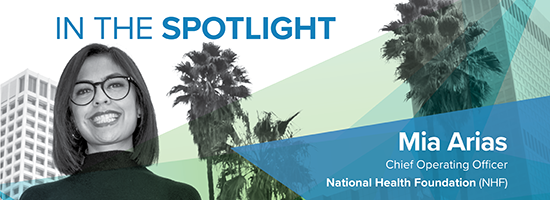In the Spotlight: Mia Arias

Mia Arias is chief operating officer at National Health Foundation – a HASC charitable partner addressing homelessness and other issues affecting underserved communities.
She sat down with HASC Strategic Communications to discuss her own goals and work – along with those of NHF. The interview is part of In the Spotlight — a series profiling people connected to the association pursuing innovative, impactful work in communities served by its members.
Download a pdf version layout of this article here or below.
You’ve been with National Health Foundation for more than a decade – moving to the COO role in 2017. What changes, growth and evolution in the organization stand out most to you?
NHF has evolved significantly over the past 10 years. We’ve transitioned from primarily conducting health research to providing direct services to under-resourced communities by addressing social determinants of health. We now recognize that to improve the health of individuals and communities, issues like systemic racism and oppression must be confronted head on and addressed through programs and interventions that ultimately effect policy change. This evolution in thought has directly impacted how we conceptualize, develop and implement our programs and the values that we embrace and uphold as an organization.
Over the past year NHF has attracted a new level of public attention for its recuperative care work and focus on homelessness. What is your role in this work – what are the challenges you face?
At NHF we utilize a shared leadership model, therefore I help oversee the operations of our three recuperative care centers, focusing specifically on program quality and outcomes. We hold our recuperative care program to a very high standard. We are never satisfied with being good – we want to be the best. The best means that every individual walking through our doors is treated with kindness, dignity and respect and that every individual walking out of our doors is closer to being housed, better able to manage their own health and more connected to community resources. While there are external factors that pose challenges to achieving this, such as the lack of housing resources in L.A., most of the challenges we face we impose upon ourselves in the pursuit of excellence.

Speaking personally, not as a NHF leader, what most concerns you – or gives you hope – regarding California’s and the U.S.’s homelessness crisis?
I am concerned about the increasing number of youth and young families entering homelessness. The cycle of poverty in California and across the nation is vicious and must be addressed to stop this trend. This will require developing anti-racist policies that tackle the systemic roots of poverty. I’m concerned that with our current political regime, this change will not occur on a national level. It gives me hope that locally, in California, we are supporting and investing in strategies and policies that strive to prevent families living in poverty from experiencing homelessness. I am also optimistic that some of the best practices we are developing hyper-locally, working hand-in-hand with communities, will be replicated to improve the health status of our under-resourced neighborhoods.
You grew up in Southern California – specifically in Long Beach. Tell us about your experience growing up there and how it’s shaped you.
You learn a lot growing up in one of the most diverse cities in the nation. Long Beach is not only culturally diverse, but also socioeconomically, religiously diverse and LGBT-friendly. I think one of the most unique aspects about Long Beach is that you can be in the most affluent part of town, but you are never a minute away from a poor, more under-resourced community. Bubbles don’t exist in Long Beach. This grounded me in an awareness of some of the issues facing low-income communities of color, because they were visible. But, more important, I also grew up witnessing the resilience, strength and transformative power these communities can harness.
Contact:
Erik Skindrud
(213) 538-0728
eskindrud@hasc.org



